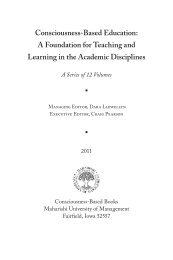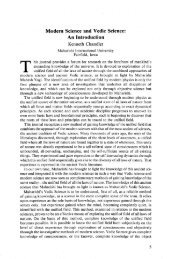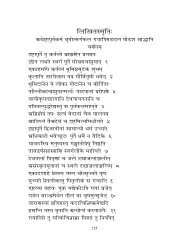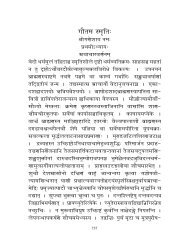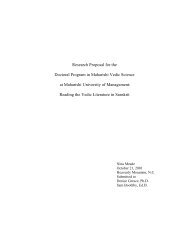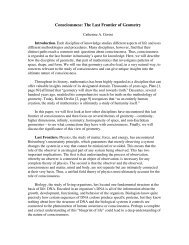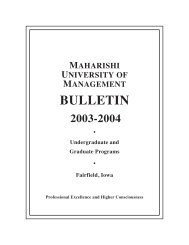The Bhagavad-Gita: A Case Study in Vedic Psychology - Maharishi ...
The Bhagavad-Gita: A Case Study in Vedic Psychology - Maharishi ...
The Bhagavad-Gita: A Case Study in Vedic Psychology - Maharishi ...
Create successful ePaper yourself
Turn your PDF publications into a flip-book with our unique Google optimized e-Paper software.
MODERN SCIENCE AND VEDIC SCIENCE<br />
<strong>The</strong> solution lies <strong>in</strong> the <strong>in</strong>fusion <strong>in</strong>to the field of duality of a non-dual element which<br />
blesses man's life with a status unaffected by suffer<strong>in</strong>g, even while he rema<strong>in</strong>s <strong>in</strong> the field<br />
where suffer<strong>in</strong>g is possible. (p. 52)<br />
Lord Krishn responds to this situation by giv<strong>in</strong>g Arjun the knowledge and experience<br />
of the field of pure <strong>in</strong>telligence which <strong>in</strong>tegrates all the manifest diversity of life. This<br />
field, described by Lord Krishn as the field of Be<strong>in</strong>g, is identified by <strong>Maharishi</strong> <strong>Vedic</strong><br />
<strong>Psychology</strong> as the unified field of natural law, the field of pure consciousness. This<br />
theme of remov<strong>in</strong>g suffer<strong>in</strong>g through attun<strong>in</strong>g <strong>in</strong>dividual life with the unified field of<br />
natural law has been previously described <strong>in</strong> terms of both <strong>Maharishi</strong> <strong>Vedic</strong><br />
<strong>Psychology</strong> and the pr<strong>in</strong>ciples of modern science (Alexander & Boyer, 1989). In the<br />
<strong>Bhagavad</strong>-<strong>Gita</strong>, Lord Krishn elaborates this same theme <strong>in</strong> terms which are concretely<br />
psychological <strong>in</strong> nature, concerned with the process of experience.<br />
Lord Krishn states that suffer<strong>in</strong>g arises from the lack of the stable <strong>in</strong>ner experience<br />
of fulfillment, which results <strong>in</strong> undue attachment to unstable external sources of satisfaction.<br />
He states:<br />
All pleasures born of contact are only sources<br />
of sorrow; they have a beg<strong>in</strong>n<strong>in</strong>g and an end,<br />
О son of Kunti [Arjun]. <strong>The</strong> enlightened man does not<br />
rejoice <strong>in</strong> them.<br />
(V. 22)<br />
In this verse, Lord Krishn po<strong>in</strong>ts out that all satisfaction that has its basis <strong>in</strong> the contact<br />
of the self with the chang<strong>in</strong>g objects of the senses, without directly experienc<strong>in</strong>g<br />
their nonchang<strong>in</strong>g basis <strong>in</strong> pure consciousness, will lead to sorrow, because one is<br />
dependent on the environment for one's happ<strong>in</strong>ess. In a subsequent verse, he tells<br />
Arjun that the enlightened person, on the basis of unshakable <strong>in</strong>ner contentment and<br />
bliss, is not at the mercy of circumstances. <strong>Maharishi</strong> (1967) comments upon this verse<br />
as follows:<br />
... the <strong>in</strong>tensity of happ<strong>in</strong>ess that one can enjoy depends on the level of one's consciousness.<br />
At every level of consciousness there is a correspond<strong>in</strong>g <strong>in</strong>tensity of happ<strong>in</strong>ess. This<br />
pr<strong>in</strong>ciple applies also to <strong>in</strong>telligence and power. ...<br />
If the self delights <strong>in</strong> the experience of objects, s<strong>in</strong>ce the objects are chang<strong>in</strong>g, the<br />
delight will soon be lost. This loss of pleasure will give rise to suffer<strong>in</strong>g. That is why the<br />
Lord says: "they have a beg<strong>in</strong>n<strong>in</strong>g and an end.... <strong>The</strong> enlightened man does not rejoice <strong>in</strong><br />
them." He who lacks contact with <strong>in</strong>ner Be<strong>in</strong>g becomes engrossed <strong>in</strong> external pleasures....<br />
When one joy comes to an end, the self is subjected to a state without joy which, <strong>in</strong> contrast<br />
with the experience of joy, is suffer<strong>in</strong>g. But if the Self has ga<strong>in</strong>ed a state of perpetual<br />
happ<strong>in</strong>ess, then It is left with no possibility of suffer<strong>in</strong>g. Absence of bliss-consciousness is<br />
the source of sorrow. (pp. 367-368)<br />
<strong>Maharishi</strong>'s analysis of suffer<strong>in</strong>g also elaborates Lord Krishna's theme by relat<strong>in</strong>g<br />
suffer<strong>in</strong>g to action which is not <strong>in</strong> tune with the laws of nature govern<strong>in</strong>g human development.<br />
<strong>The</strong> <strong>in</strong>ner fulfillment of bliss is found <strong>in</strong> the direct experience of pure con-<br />
110




